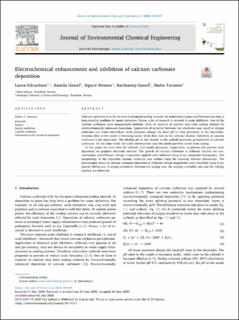Electrochemical enhancement and inhibition of calcium carbonate deposition
Peer reviewed, Journal article
Published version

Åpne
Permanent lenke
https://hdl.handle.net/11250/2669300Utgivelsesdato
2020Metadata
Vis full innførselSamlinger
- Institutt for fysikk [2686]
- Institutt for materialteknologi [2545]
- Publikasjoner fra CRIStin - NTNU [38062]
Originalversjon
Journal of Environmental Chemical Engineering. 2020, 8 (5) 10.1016/j.jece.2020.104239Sammendrag
Calcium carbonate is by far the most widespread scaling material. Its deposition in pipes and flowlines has been a long-standing problem for many industries. Hence, a lot of research is devoted to scale inhibition. One of the calcium carbonate scale management methods relies on removal of calcium ions from scaling solution by electrochemically enhanced deposition. Application of potential between two electrodes may result in oxygen reduction and water electrolysis. Both processes change the local pH in close proximity to the electrodes. Solution close to the anode is becoming acidic while that close to the cathode alkaline. Solubility of calcium carbonate is pH dependent. The alkaline pH in the vicinity of the cathode promotes precipitation of calcium carbonate. On the other hand, the acidic environment near the anode prevents anode from scaling.
In this paper we show how the cathodic and anodic processes, respectively, accelerate and prevent scale deposition on graphite electrode surfaces. The growth of calcium carbonate at different calcium ion concentrations and different voltage magnitudes applied were followed using X-ray computed tomography. The morphology of the deposited calcium carbonate was studied using the scanning electron microscopy. The polymorphic forms of calcium carbonate deposited at different voltage magnitudes were identified using X-ray powder diffraction. A strong correlation between the scaling rate, the average crystallite size and the voltage applied was observed.
